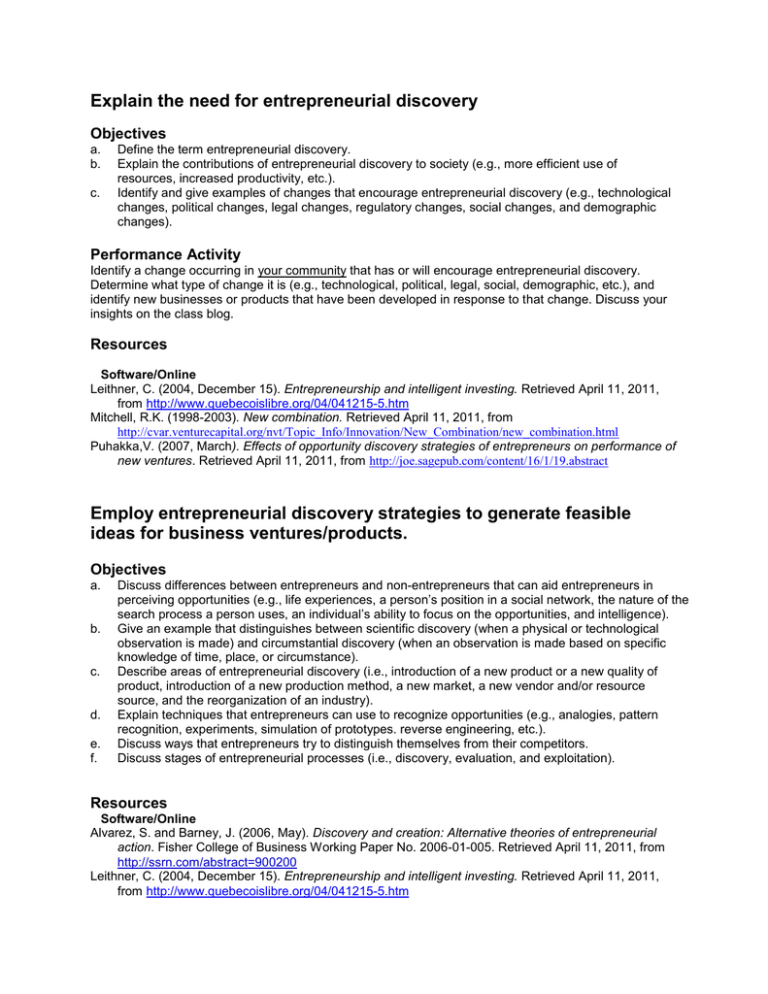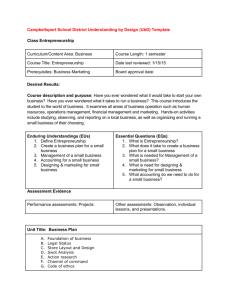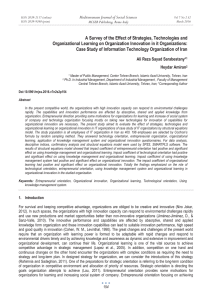2.03 Discovering Venture Opportunities Handout
advertisement

Explain the need for entrepreneurial discovery Objectives a. b. c. Define the term entrepreneurial discovery. Explain the contributions of entrepreneurial discovery to society (e.g., more efficient use of resources, increased productivity, etc.). Identify and give examples of changes that encourage entrepreneurial discovery (e.g., technological changes, political changes, legal changes, regulatory changes, social changes, and demographic changes). Performance Activity Identify a change occurring in your community that has or will encourage entrepreneurial discovery. Determine what type of change it is (e.g., technological, political, legal, social, demographic, etc.), and identify new businesses or products that have been developed in response to that change. Discuss your insights on the class blog. Resources Software/Online Leithner, C. (2004, December 15). Entrepreneurship and intelligent investing. Retrieved April 11, 2011, from http://www.quebecoislibre.org/04/041215-5.htm Mitchell, R.K. (1998-2003). New combination. Retrieved April 11, 2011, from http://cvar.venturecapital.org/nvt/Topic_Info/Innovation/New_Combination/new_combination.html Puhakka,V. (2007, March). Effects of opportunity discovery strategies of entrepreneurs on performance of new ventures. Retrieved April 11, 2011, from http://joe.sagepub.com/content/16/1/19.abstract Employ entrepreneurial discovery strategies to generate feasible ideas for business ventures/products. Objectives a. b. c. d. e. f. Discuss differences between entrepreneurs and non-entrepreneurs that can aid entrepreneurs in perceiving opportunities (e.g., life experiences, a person’s position in a social network, the nature of the search process a person uses, an individual’s ability to focus on the opportunities, and intelligence). Give an example that distinguishes between scientific discovery (when a physical or technological observation is made) and circumstantial discovery (when an observation is made based on specific knowledge of time, place, or circumstance). Describe areas of entrepreneurial discovery (i.e., introduction of a new product or a new quality of product, introduction of a new production method, a new market, a new vendor and/or resource source, and the reorganization of an industry). Explain techniques that entrepreneurs can use to recognize opportunities (e.g., analogies, pattern recognition, experiments, simulation of prototypes. reverse engineering, etc.). Discuss ways that entrepreneurs try to distinguish themselves from their competitors. Discuss stages of entrepreneurial processes (i.e., discovery, evaluation, and exploitation). Resources Software/Online Alvarez, S. and Barney, J. (2006, May). Discovery and creation: Alternative theories of entrepreneurial action. Fisher College of Business Working Paper No. 2006-01-005. Retrieved April 11, 2011, from http://ssrn.com/abstract=900200 Leithner, C. (2004, December 15). Entrepreneurship and intelligent investing. Retrieved April 11, 2011, from http://www.quebecoislibre.org/04/041215-5.htm








